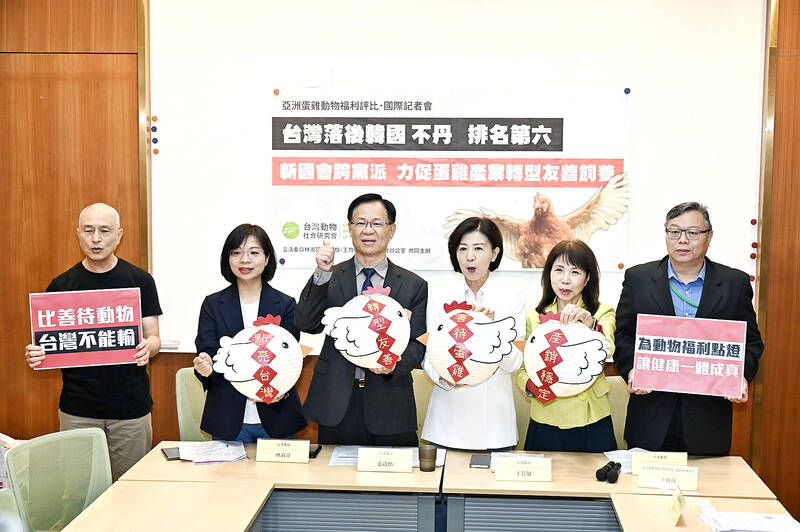Lawmakers and activists on Thursday urged the government to support a transition to cage-free chicken farming after Taiwan ranked sixth out of 17 countries in Asia in an independent report that evaluated countries on the progress made toward abolishing battery cages.
The Asia Cage-Free Benchmark report also assessed assistance provided to farms making the transition and animal welfare laws protecting egg-laying chickens.
The report is a collaborative initiative of members of the Open Wing Alliance, led by the Environment & Animal Society of Taiwan. The Open Wing Alliance, a global coalition that unites more than 90 organizations from 67 countries, aims to end abuse of chickens.

Photo: Tu Chien-jung, Taipei Times
Taiwan scored 29 points out of 140, placing it behind New Zealand, which was in the top spot, followed by Israel, Australia, Bhutan and South Korea, in that order. Taiwan scored zero in progress made toward abolishing battery cages.
A lack of clarity in government policies has made poultry farmers cautious about cage-free farming, despite the nation’s commitment to it and offer of subsidies, Environment & Animal Society of Taiwan's Director of Campaigns and Communications Chune Fang-chu (寸舫筑) said.
Getting rid of cages requires a coordinated policy response that integrates avian flu prevention efforts, humane poultry farm designs, balanced supply and demand, incentives for young people to work in the industry and legislation targeting agricultural pollution, she said.
Democratic Progressive Party (DPP) Legislator Lin Shu-fen (林淑芬) said that she, like other consumers, is glad about the government’s effort to phase out battery cages, but not enough public resources have been put toward upgrading the industry.
The Ministry of Agriculture must take a more active approach in handing out subsidies and promoting its policies instead of expecting things to change by themselves, she said, adding that subsidies for land and loans should be prioritized.
It is scientifically proven that cage-free poultry farming results in improved egg yields and a reduction in drug use, and is more sustainable, Chinese Nationalist Party (KMT) Legislator Alicia Wang (王育敏) said.
The use of cages has a negative impact on egg production, as Taiwanese hens on average lay 0.52 eggs each per day, which is significantly lower than the global average, Taiwan People’s Party Legislator Chang Chi-kai (張啟楷) said.
On average, Japanese hens lay 0.8 eggs per day, US hens lay 0.78 eggs per day and Canadian hens lay 0.81 eggs per day, he added.
Department of Animal Industry head Chen Chung-hsing (陳中興) said that Taiwan had to increase the recommended hen-to-floorspace ratio to deal with egg shortages during the COVID-19 pandemic.
Maximum loan of NT$50 million is offered to poultry farmers to reduce or eliminate their use of battery cages and local governments are being advised to change their regulations to facilitate the transition to cage-free farming, he said.

Chinese Nationalist Party (KMT) Chairman Eric Chu (朱立倫), spokeswoman Yang Chih-yu (楊智伃) and Legislator Hsieh Lung-chieh (謝龍介) would be summoned by police for questioning for leading an illegal assembly on Thursday evening last week, Minister of the Interior Liu Shyh-fang (劉世芳) said today. The three KMT officials led an assembly outside the Taipei City Prosecutors’ Office, a restricted area where public assembly is not allowed, protesting the questioning of several KMT staff and searches of KMT headquarters and offices in a recall petition forgery case. Chu, Yang and Hsieh are all suspected of contravening the Assembly and Parade Act (集會遊行法) by holding

PRAISE: Japanese visitor Takashi Kubota said the Taiwanese temple architecture images showcased in the AI Art Gallery were the most impressive displays he saw Taiwan does not have an official pavilion at the World Expo in Osaka, Japan, because of its diplomatic predicament, but the government-backed Tech World pavilion is drawing interest with its unique recreations of works by Taiwanese artists. The pavilion features an artificial intelligence (AI)-based art gallery showcasing works of famous Taiwanese artists from the Japanese colonial period using innovative technologies. Among its main simulated displays are Eastern gouache paintings by Chen Chin (陳進), Lin Yu-shan (林玉山) and Kuo Hsueh-hu (郭雪湖), who were the three young Taiwanese painters selected for the East Asian Painting exhibition in 1927. Gouache is a water-based

Taiwan would welcome the return of Honduras as a diplomatic ally if its next president decides to make such a move, Minister of Foreign Affairs Lin Chia-lung (林佳龍) said yesterday. “Of course, we would welcome Honduras if they want to restore diplomatic ties with Taiwan after their elections,” Lin said at a meeting of the legislature’s Foreign Affairs and National Defense Committee, when asked to comment on statements made by two of the three Honduran presidential candidates during the presidential campaign in the Central American country. Taiwan is paying close attention to the region as a whole in the wake of a

OFF-TARGET: More than 30,000 participants were expected to take part in the Games next month, but only 6,550 foreign and 19,400 Taiwanese athletes have registered Taipei city councilors yesterday blasted the organizers of next month’s World Masters Games over sudden timetable and venue changes, which they said have caused thousands of participants to back out of the international sporting event, among other organizational issues. They also cited visa delays and political interference by China as reasons many foreign athletes are requesting refunds for the event, to be held from May 17 to 30. Jointly organized by the Taipei and New Taipei City governments, the games have been rocked by numerous controversies since preparations began in 2020. Taipei City Councilor Lin Yen-feng (林延鳳) said yesterday that new measures by